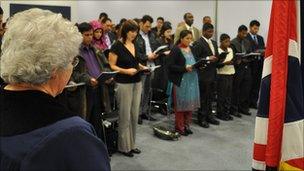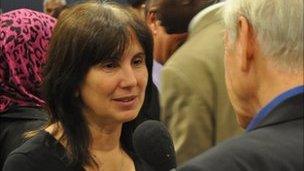Does Britain's sense of fair play attract immigrants?
- Published

Many new British citizens believe they will be treated more fairly in here than in their former home
Britain's generous welfare state, and the English language, are often cited as the main draws for immigrants coming to these shores. But are they also attracted here for more ideological reasons, that shed light on what the British sense of fairness means?
In a small, nondescript room attached to the public library in the London borough of Ealing, an assorted group of people - men women and children, black, brown and white - rise to their feet, announce their names and swear an oath of allegiance.
They have just become British citizens.
This little ceremony takes place almost every day of every week in towns and cities across the country.
Modest it may be, with no heavily bewigged judge in scarlet robes, just a former mayor standing patiently beside a furled Union flag, waiting to hand out certificates.
But it is hard not to be a bit moved all the same.
"Becoming British is a very important event in my life, because I feel that this country treats people like human beings," new citizen Orlena Lavrenchuk, who has come here from Ukraine, tells me.
Being treated like a human being means being treated fairly. For her, this means leaving a country where you need money and power to be successful, and joining one where all you need is to be "honest and have enough skills".

Orlena Lavrenchuk believes Britain will be a fair place to live "if you do things correctly"
"If I do things correctly," she says, "I can get success. In our country it is different."
The thought is echoed by an Afghan man I met at the ceremony.
"Fairness is basically treating people as equal and respecting their rights, respecting their freedoms and abiding by the laws," he tells me.
Let's accept that the people in this Ealing library are hardly representative. They have invested a lot of time, effort and money - more than £800 apiece - into becoming British citizens.
Work ethic
They wouldn't have done that if they thought they'd be treated unfairly in their new country.
So we're back to the old problem of defining fairness.
Can ours really be a fair society when social mobility has ground to a halt, when a poor child stands a tiny chance of getting into a top university compared with a rich child, when the gap between the income of bosses and workers has widened massively over recent years?
You might expect to find that this rankles with the poorly-paid immigrants, who clean the offices of the fat cats long before they arrive for work. You might be surprised.
"People who work sometimes don't get as much wages as they should have, while if they sit back on the benefit the bills are paid," says David Forbes, a Jamaican cleaner on a London night bus.
Equality in queuing
"People who come to this country, who know what it's like to work very hard, they actually put the effort in. But people who actually live here, are born here, sometimes are more laid back.
"Laid back is much more profitable than working sometimes."
So if you are near the bottom of the ladder from a poor country, you are more likely to be cross about the scroungers lower than you, than those higher up the ladder.
At the bottom of it, many would-be immigrants from poorer countries believe British people abide by the rules and treat each other fairly, says former diplomat Robert Cooper.
"They think British people have a strong sense, personally, of fairness. When two or three British people are gathered together they form a queue."
But in richer, more egalitarian countries like Germany or Sweden, he says, Britain is viewed as being one of the more unequal societies in Europe because of the gap between rich and poor and the link between wealth and education.
Demand for big houses
"In a country like Germany nobody thinks of going to a fee paying school," he says.
Hazel Ware, a former mayor of Ealing, is the woman who handed out the certificates at the citizenship ceremony. She loves doing it, but she has her own worries about British fairness.
"If you looked at all our social services, they get exactly the same as we do. Many of them haven't put any money into the country, but they take the rewards," she tells me.
"I don't think people coming into the country should expect us to give them everything that they want all at once. I think they've got to prove that their needs are such that they require these things.
"There are some people who come in and demand big houses. I don't think that's fair on our people."
So this business of foreigners and fairness cuts both ways. They expect fairness from us. We expect them to play the game as well.
- Published7 October 2010
- Published13 October 2010